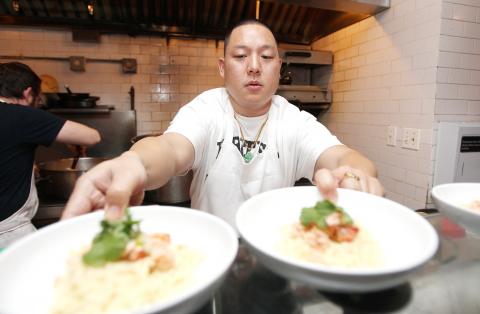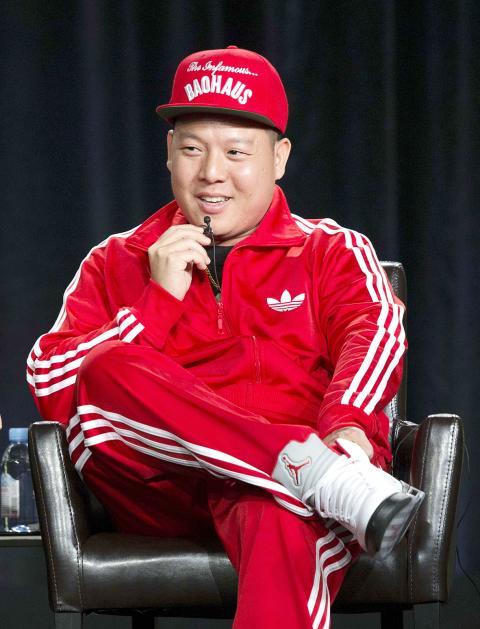A few years ago, after Eddie Huang submitted the manuscript of his memoir Fresh Off the Boat, which made ample use of footnotes, his editor, Chris Jackson, asked him if he’d read fellow footnoter Junot Diaz. He had not.
“I have real gaps in my literary history,” Huang said recently, with his signature blend of self-deprecation and upstart bravado. “Number 1, I’m Chinese, and Number 2, I’m from Orlando. So help me, fam!”
He began Diaz’s The Brief Wondrous Life of Oscar Wao, but stopped after 100 pages, wowed and flummoxed: “I didn’t want to steal his moves.” He didn’t return to it until he had completed the first draft of his new memoir, Double Cup Love: On the Trail of Family, Food, and Broken Hearts in China (Spiegel & Grau), which was released on Tuesday.

Photo: AP
“I was chasing him through the last eight revisions, asking myself, ‘Does this give you feelings on that level that Oscar Wao gave you?’ ” Huang said. “I got as close as I could.”
It was coming up on midnight in New York when he said this, and he was wearing a jubilantly loud J.W. Anderson coat with fat horizontal stripes in varying shades of brown. It was cold out, and a few feet away was the Gilded Lily, the club where he was about to host a party with the fashion designer Maxwell Osborne, of the au courant duo Public School.
But before that, one last point. “People always want to compare me to Tony,” Huang added, referring to Anthony Bourdain, the modern prototype of chef turned acidic social commentator. “But I never read Kitchen Confidential. I read Oscar Wao.”

Photo: REUTERS
FOOD TO FAME
Food is, as ever, a Trojan horse for Huang, who in the past five years has parlayed fame (and a little bit of infamy) as a chef into a career of pining, bomb-tossing and taunting — sometimes good-naturedly, sometimes bad-naturedly, sometimes both.
In addition to his two memoirs (his first was turned into an ABC sitcom), he’s given a memorable TED talk (then had his TED fellowship rescinded over disagreements with the foundation); written the occasional scathing takedown article; been featured in a Sprite commercial; and hosted an Internet show about global food culture, which has morphed into the television show Huang’s World, on Viceland.
Throughout, hip-hop has been his framework and organizing narrative. On the difference between his first memoir and the new one: “Fresh Off the Boat is a mixtape — the Cam’ron mixtape before Purple Haze; Double Cup Love is the album. I smoothed things out, I mixed it, I was surgical about it.”
In Double Cup Love, Huang, 34, who was born in Falls Church, Virginia, near Washington, to Taiwanese immigrants, and raised in Orlando, Florida, details his parallel quests for acceptance: by China, and by a woman he fell for and eventually proposed to. “I don’t think I was ever able to be as close with someone as I was with her, and I don’t think I was ever as able to be comfortable with being Chinese as I was with Chengdu,” he said.
Exclusion is a continuing theme of Huang’s work, and he often finds himself at odds, he said, with Asian-Americans who feel his story isn’t appropriately representative. “A lot of people are trying to actively contain my voice, like, ‘He doesn’t speak for us,’ and I’m like, ‘I won’t argue with you.’” Often, he said, he speaks at colleges where the main question he’s asked is, in essence, “How did you learn to love yourself?”
Huang’s writing is wry and zippy; he regards the world with an understanding of its absurdities and injustices and with a willingness to be surprised. The dark edge of Fresh Off the Boat is mostly gone in the new book, replaced with an acceptance of calm in his life.
AGAINST THE GRAIN
Double Cup Love was originally proposed as a book in which Huang would travel to China to try cooking for locals, but it turned into a memoir about love. Neither of his books is really about food — “it’s all window dressing,” he said.
He added: “When you live in a place where you are not the dominant culture, you have to play fools against themselves. You’re going to assume I can kung fu, you’re going to assume I can cook food, and I’m going to play this against you.”
Still, even if food is only the costume, it occupies a central role in Huang’s life. Before the party at the Gilded Lily, Huang had begun his evening cooking a private dinner for a music lawyer and some associates, including Florence Welch (of Florence and the Machine) and the songwriter-producer Emile Haynie. After that, it was on to Sushi Yasuda in Midtown, for a seat at the counter and some fawning over the omakase, with running commentary after he popped each piece into his mouth with his hands.
Huang began writing during high school as a reaction to hearing other students disparage hip-hop. It was “a call to arms,” he said. “I decided I’ll write about anything unfair.”
Righting injustices remains a crux of his work: He devoted much of a recent “Huang’s World” episode about Jamaica to the “new colonialism” caused by that nation’s crippling debt, and said that he hoped to go to Kenya to learn more about one organization’s attempt to support a universal baseline income — a policy he described as “reparations for those who don’t fit in.”
Even though Huang has rabbis who’ve smoothed his path toward the mainstream — his editor, Jackson; Shane Smith of Vice; Michael Lombardo, HBO’s president of programming, who is stepping down — the defining throughline of his public life has, until now, been a tug of war with authority.
But lately he’s been wondering if his bomb-throwing days are coming to an end. “I’m not as much of an outsider now,” he conceded. “People can make money off of me — I’m a proven commodity.”

The latest military exercises conducted by the People’s Liberation Army (PLA) last week did not follow the standard Chinese Communist Party (CCP) formula. The US and Taiwan also had different explanations for the war games. Previously the CCP would plan out their large-scale military exercises and wait for an opportunity to dupe the gullible into pinning the blame on someone else for “provoking” Beijing, the most famous being former house speaker Nancy Pelosi’s visit to Taiwan in August 2022. Those military exercises could not possibly have been organized in the short lead time that it was known she was coming.

From an anonymous office in a New Delhi mall, matrimonial detective Bhavna Paliwal runs the rule over prospective husbands and wives — a booming industry in India, where younger generations are increasingly choosing love matches over arranged marriage. The tradition of partners being carefully selected by the two families remains hugely popular, but in a country where social customs are changing rapidly, more and more couples are making their own matches. So for some families, the first step when young lovers want to get married is not to call a priest or party planner but a sleuth like Paliwal with high-tech spy

With raging waters moving as fast as 3 meters per second, it’s said that the Roaring Gate Channel (吼門水道) evokes the sound of a thousand troop-bound horses galloping. Situated between Penghu’s Xiyu (西嶼) and Baisha (白沙) islands, early inhabitants ranked the channel as the second most perilous waterway in the archipelago; the top was the seas around the shoals to the far north. The Roaring Gate also concealed sunken reefs, and was especially nasty when the northeasterly winds blew during the autumn and winter months. Ships heading to the archipelago’s main settlement of Magong (馬公) had to go around the west side

When Portugal returned its colony Macao to China in 1999, coffee shop owner Daniel Chao was a first grader living in a different world. Since then his sleepy hometown has transformed into a bustling gaming hub lined with glittering casinos. Its once quiet streets are now jammed with tourist buses. But the growing wealth of the city dubbed the “Las Vegas of the East” has not brought qualities of sustainable development such as economic diversity and high civic participation. “What was once a relaxed, free place in my childhood has become a place that is crowded and highly commercialized,” said Chao. Macao yesterday